Friends, family, colleagues, and students gathered in the charming and wood-panelled Billiard Room at McGill’s historic Faculty Club to honour Gershon Hundert (1946-2023), a beloved Professor at McGill and member of the Montreal and Jewish community.
It was the perfect backdrop to conclude the two-day symposium, which began on Sunday, September 22, celebrating Hundert’s extraordinary life, legacy, and 48-year tenure at McGill University. Widely regarded as one of his generation’s leading Jewish historians, Hundert produced groundbreaking research on Eastern European Jewry that reshaped the field and continues to inspire scholars worldwide.
In addition to being a remarkable friend and family member, Hundert also left a lasting impact on his students. To capture the profound impact of Hundert’s work and personal influence, one of his former students, Lily Smrtic, who had him as a professor last year, shared, “I’m grateful this event is happening. He was such an incredible professor, and it’s heartwarming to see him being remembered meaningfully.”
Ula Madej-Krupitski, Assistant Professor in the McGill Jewish Studies department and the symposium organiser, exemplifies Hundert’s lasting influence on students and colleagues. As a student, she was unsure of what to focus her Jewish Studies research on until she read Hundert’s work, which inspired her to pursue Polish-Jewish history.
When she interviewed for a position at McGill in December 2018, she was eager but nervous to finally meet Hundert. “He put me at ease,” she recalled, as he spoke to her in Polish, making her feel “almost at home, even though it was just a job interview” After she secured the job and moved to Montreal in 2019, Hundert supported her transition, inviting her to holidays like Shabbat and Rosh Hashana. His sudden passing was “a shock,” but Madej-Krupitski felt driven to organise this conference to honour his legacy and ensure his contributions to the field of Jewish history were recognized at McGill and beyond.
The symposium’s first day was held at the Reconstructionist Synagogue of Montreal, Congregation Dorshei Emet, where Hundert was a member. Speakers such as Olga Litvak from Cornell University shared personal experiences they had with Hundert and discussed how his research had impacted their own. Litvak’s talk, titled Remapping Jewish Modernity: The Legacy of Gershon Hundert, set the tone for what promised to be a series of thought-provoking discussions.
The symposium’s second day took place at the Faculty Club. Guests attended four sessions from 9 a.m. to 6 p.m., followed by dinner offsite. Each session lasted about an hour and a half, featuring presentations from two to three panellists, most presenting unpublished works influenced by Hundert’s research.
The connection between border studies and Hundert’s legacy was initially unclear, but it soon became evident as the panellists shared how deeply Hundert influenced their thinking and research. Speakers expressed deep gratitude for Hundert's lifelong work, friendship, and kindness. Brown University professor Adam Teller said that he wished he “could have benefited from Gershon’s comments,” on his most recent research.
As the symposium ended, it was clear that Gershon Hundert’s legacy extends far beyond his remarkable scholarship. His profound impact on colleagues, students, and friends was evident in the heartfelt tributes and the profoundly personal reflections shared throughout the event. Hundert’s work reshaped the field of Jewish history, but his kindness, mentorship, and humanity left an equally lasting mark on those who knew him. This tribute was not just a reflection on his academic contributions but a celebration of the man himself—someone whose influence will continue to inspire and shape future generations for years to come.
Powered by Froala Editor






